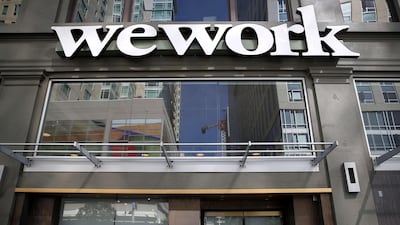WeWork is locked in negotiations this week with its largest shareholder, Softbank Group, over a new $1 billion (Dh3.67bn) investment to enable the shared office space company to go through a major restructuring.
If the talks are successful, WeWork, which had to abandon an initial public offering last week because of investor concerns about how it was valued and its business model, will seek to negotiate a $3bn debt deal with JPMorgan Chase, the sources said.
SoftBank founder and chief executive Masayoshi Son publicly backed WeWork in an interview with Nikkei Business magazine this week, saying in 10 years the company would be "making substantial profits".
WeWork and SoftBank did not immediately respond to requests to comment.
However, SoftBank and its Vision Fund, which controls about 29 per cent of WeWork after investing or committing to invest $10.65bn, are facing unusual crosscurrents as they seek a new deal.
SoftBank wants to renegotiate a $1.5bn warrant deal, which was agreed in January based on WeWork being valued at around $47bn, before providing the additional $1bn, one of the sources said.
WeWork's valuation estimates had fallen to as low as $10bn to $12bn around the time it decided to abandon the IPO last month.
Normally, SoftBank would be expected to seek as low of a valuation as possible for the renegotiated and new investments so that it can pick up a bigger stake.
But securities analysts say if it invests in WeWork at a valuation below the $24bn to $26bn range, which is the estimated basis for its entire stake, then SoftBank and its Vision Fund could suffer paper losses. Those would be large if the valuation were closer to $10bn.
The success of the talks with both SoftBank and Wall Street is essential if WeWork is going to survive in anything like its current form.
The company was already expected to pare back its ambitions significantly and to cut several thousand jobs, a source familiar with the matter said.
WeWork lost $1.9bn in 2018 and burnt through $2.36bn in cash in the first half of this year, and it could run out of money in the second quarter of 2020 at its current burn rate, an analysis by securities house Sanford C. Bernstein & Co revealed last week.
WeWork hopes to complete the talks with SoftBank and JP Morgan as early as next week, the sources said. They said the plans are subject to change and the timetable may still shift.
The bank does not want to get into intensive negotiations over the debt deal until it is sure that SoftBank has reached a new financing deal, one of the sources said.
It was unclear what kind of collateral the bank would demand.
Originally, a group of banks was prepared to provide WeWork with a $6bn line of credit provided it raised $3bn in the IPO.
JPMorgan declined to comment.
SoftBank has been reluctant to plough more cash into WeWork but now concludes that a fresh investment is necessary to have any hope of salvaging the investment it has already made, one source said.
In the run-up to the planned IPO, investors raised concerns about WeWork's ballooning losses and the potentially risky way in which it operates by signing long-term leases and then renting out space on a short-term basis.
In recent weeks, global credit rating agencies Standard & Poor's and Fitch Ratings also downgraded WeWork's credit ratings, sending it deeper into junk territory, while the company's junk bond is trading at a record low.
WeWork last month replaced co-founder Adam Neumann as chief executive with insiders Artie Minson and Sebastian Gunningham taking on the joint chief executive roles.
The pair have talked about the need to return to WeWork's core business of renting out trendy office space to freelancers and enterprises. That would pull the company back from the fringe activities Mr Neumann had forayed into, such as a school, apartment buildings and various businesses.
The firm expects to tell staff about jobs cuts and planned divestments as early as next week, hoping the news will coincide with a new financing deal being in place, the sources said, again cautioning that the timeline is subject to change.

